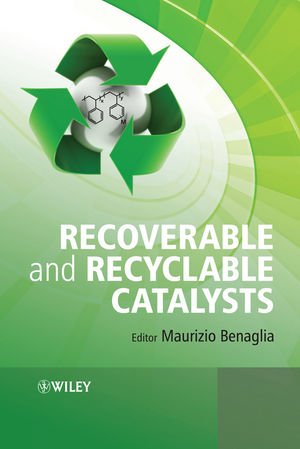Recoverable and Recyclable CatalystsISBN: 978-0-470-68195-4
Hardcover
490 pages
October 2009
 This is a Print-on-Demand title. It will be printed specifically to fill your order. Please allow an additional 10-15 days delivery time. The book is not returnable.
|
||||||
Connect with Wiley Publicity
The essential practical guide to the use of recoverable and recyclable catalysts is now published by Wiley-Blackwell. Drawing on international research, Recoverable and Recyclable Catalysts is key to improving both the efficiency and environmental acceptability of industrial processes.
Some 90% of all commercially produced chemical products involve the use of catalysts at some stage. Maurizio Benaglia explores this most important topic in green chemistry, as the demand for improved efficiency and environmental acceptability of industrial processes drives research and development in this area forward. The topic has practical applications in many industries including pharmaceuticals, agrochemicals, commodity, specialty and fine chemicals.
Recoverable and Recyclable Catalysts is essential for anyone working in catalysis, whether they are academic organic chemists, or chemists and chemical engineers working in catalysis in industry.
Benaglia’s above all practical guide compares different catalytic systems so the reader can easily see which approach would work for them. Each chapter combines basic general principles, practical information on the design and synthesis of catalysts, and strategies for catalyst recovery. The book concludes with a comparison of several different catalytic systems, so the reader can easily compare catalysts, and the positive and negative features of each approach.
Contents
General principles of catalyst recovery and recycling
Catalysts on insoluble or soluble supports
Thermoresponsive catalysts
Self-supported catalysts
Perfluorous catalytic systems
Biphasic systems
Recoverable organic catalysts
Microencapsulated catalysts
Flow/membrane reactors
Microreactor technologies
Comparison of several different catalytic systems



